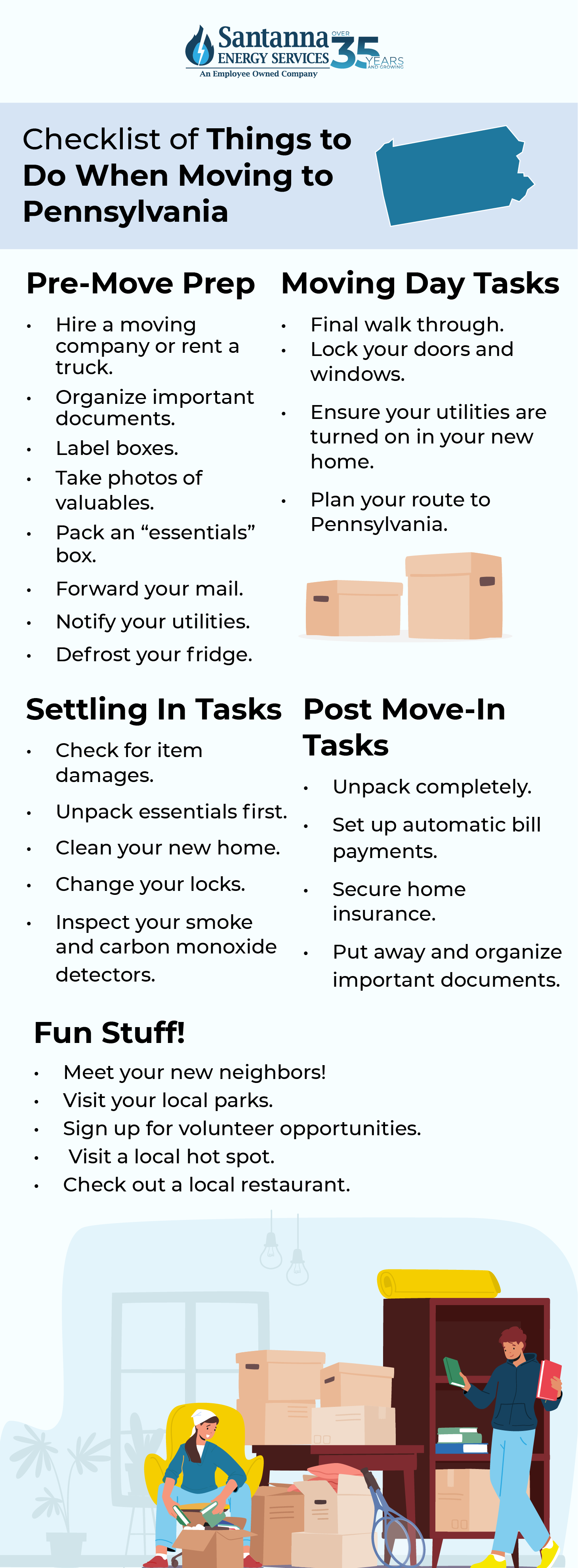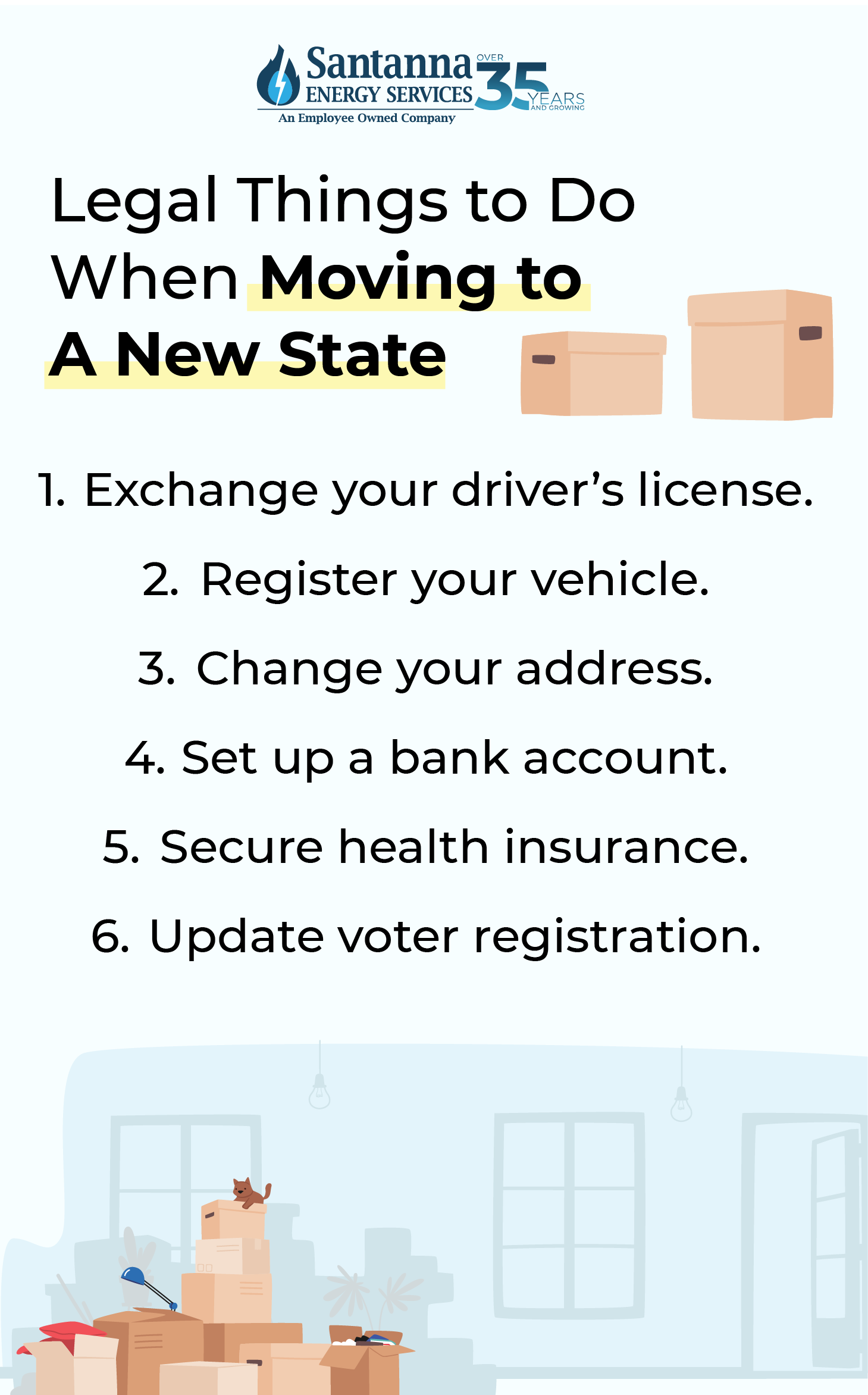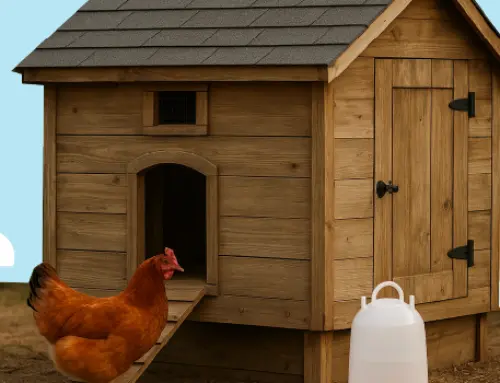Full Checklist of Things to Do When Moving to Pennsylvania
by Jenna Mendez
13.6 min read

Considering moving to PA? Making the move to Pennsylvania offers an exciting opportunity to explore a state full of history, nature, and diverse communities. Whether you’re relocating for a new job, school, or a change of scenery, settling into your new home can be a smooth process with the right preparation.
Our checklist is a great tool to help you stay organized and ensure nothing is overlooked as you transition to life in the Keystone State.
Key Points of This Article:
- You must update key legal items after moving, including getting a PA driver’s license within 60 days and registering your vehicle within 20 days.
- Before moving, it’s essential to organize documents, prepare essentials, label boxes, and set up utilities for a smooth transition.
- After arrival, focus on unpacking essentials, checking safety devices, cleaning, and securing your home.
- New residents should also change their address, update voter registration, and review health insurance options to complete their relocation.
Checklist of things to do when moving to Pennsylvania
Whether you’re moving from out of state to PA or moving to a new city within it, we have your complete checklist!

Pre-move preparations
The act of moving is stressful enough. Knowing what to do before moving day makes all the difference in a smooth transition. Here are our top items to tackle as you prepare to make your move:
- Hire a Moving Company or Rent a Truck – Research moving companies or truck rental services to fit your budget and distance. Book early, especially if you’re relocating from a long distance to PA.
- Organize Important Documents – Gather essential paperwork such as personal identification, contracts, moving agreements, lease/mortgage papers, and utility documents. Keep these in a safe, accessible place.
- Label Boxes – Mark each box clearly with its contents and the room it belongs to.
- Take Photos of Valuables – Document high-value items, especially electronics and furniture, for insurance claims in case of damage during the move.
- Pack an Essentials Box – Pack a box with daily necessities like toiletries, chargers, change of clothes, medications, basic tools, and cleaning supplies for immediate use upon arrival.
- Forward Your Mail – Update your mailing address with USPS and notify banks, subscription services, and other entities of your new address.
- Notify Utilities and Services – Contact utility companies to disconnect utilities at your old home and begin connecting services like electricity, water, gas, and internet at your new home in PA.
- Defrost Refrigerator/Freezer – If you’re moving appliances, defrost your refrigerator or freezer at least 24 hours before moving to avoid leaks and spoilage. Be sure to clean it too to ensure a smooth relocation!
Moving day tasks
- Final Walkthrough of Your Old Home – Check every room, closet, and drawer to make sure you haven’t forgotten anything important.
- Lock Windows and Doors – Secure your old home by locking all windows and doors before leaving for the last time.
- Ensure Your Utilities are Turned on in Your New Home – Verify that utilities like electricity, water, and internet are functioning properly in your new home. Be sure to get in contact with all your utility providers to ensure you can start using your appliances in your new home right away.
- Plan Your Route to Pennsylvania – If you’re driving to PA, plan your route, including stops for food, rest, and gas. If flying, ensure your travel arrangements are confirmed.
Settling in tasks
- Check for Damages – Inspect your belongings for damage caused during transit, and report issues to your moving company or insurance provider as soon as possible.
- Unpack Essentials First – Focus on unpacking the most critical items, like bedding, kitchenware, and toiletries, so you can comfortably settle in for the first few nights.
- Clean Your New Home – Clean your new space before fully unpacking, especially bathrooms and kitchens, to start off with a fresh environment.
- Change the Locks – For added security, consider changing the locks on all doors, especially if your new home has previous occupants.
- Inspect Smoke and Carbon Monoxide Detectors – Ensure all detectors are properly installed and functional, as this is a vital safety measure in any new home.
- Explore Your Neighborhood – Walk around your new community to familiarize yourself with stores, parks, and essential services.
- Meet Your Neighbors – Introduce yourself to neighbors to begin building a sense of community and establishing local connections.
Post-move tasks
- Unpack Completely – Tackle unpacking room by room to avoid overwhelming yourself. Start with essential rooms like the bedroom, bathroom, and kitchen.
- Set Up Automatic Bill Payments – Set up auto-pay for utilities, mortgage or rent, and other services to avoid late fees and missed payments.
- Secure Home Insurance – Make sure your new home is covered with the appropriate homeowner’s or renter’s insurance for financial protection.
- Put Away and Organize Important Documents – Account for all your important documents and scope out a secure place to store them for later use.
Legal things to do when moving to a new state
If you’re moving from a different state to Pennsylvania, there are several legal things you must do to secure your new PA residency. For most of these assignments, you’ll have a small timeframe to finish them but be sure to accomplish them at the earliest opportunity.

- Exchanging Your Driver’s License – Pennsylvania requires you to obtain a new driver’s license within 60 days of becoming a resident. You’ll need to appear in person to do this and you’ll have to surrender your old driver’s license to obtain a new PA card.
- Registering Your Vehicle – If you’re moving to PA from out of state, you’ll have 20 days to apply for a Pennsylvania title and registration for your vehicle. To apply for a PA vehicle registration, individuals are required to have an official form of Pennsylvania identification.
- Changing Your Address – Notify all relevant entities such as your employer, credit card companies, and subscription services of your new address. Pennsylvania offers an online address change service.
- Setting Up a Bank Account – If needed, set up a local bank account.
- Getting Health Insurance – If you haven’t already, research health insurance options available in Pennsylvania, either through employers or state exchange plans.
Things to do before moving out of state
Moving out of another state to Pennsylvania can be a huge transition. From adapting to a new climate and lifestyle to navigating different local laws and regulations, there’s a lot to manage during the move. While we’ve covered the most immediate things to complete when you make your move, here’s a list of the long-term tasks you should consider completing:
Update voter registration
You must be a U.S. citizen, a resident of Pennsylvania for at least 30 days before the next election, and at least 18 years old by the election day. You can register to vote by visiting the Pennsylvania Department of State’s Online Voter Registration portal.
Be sure that your address is updated to a PA address BEFORE you register or else you won’t qualify. Complete the form with your information, including your new address. You’ll need a valid PA driver’s license to use this service online.
After completing the form, submit it electronically. You will receive a confirmation number to track the progress of your application.
If you prefer, you can print a Voter Registration Application, fill it out, and mail it to your county voter registration office. For the full steps on registering to vote online, by mail, and in person, visit our article here!
Enroll in healthcare
If you have a job in your new state, check if your employer provides health insurance as part of the benefits package. Speak to HR about enrollment periods and coverage options. If you’re not covered through an employer, you can explore plans via the Health Insurance Marketplace at HealthCare.gov.
Explore local resources
Explore your neighborhood parks for opportunities to join recreational leagues or other outdoor activities that promote fitness and social engagement. These are great ways to connect with your new community and enjoy what your local area has to offer. Check out local community events like the Philadelphia Flower Show, if you’re moving to that area.
Pennsylvania’s public libraries are great community resources, offering books, digital media, research assistance, and public programs. Smaller towns and communities also have local libraries that offer valuable services such as book clubs, children’s programs, and adult education courses.
Volunteer opportunities
Get involved in your local community in the best way! Volunteer at local organizations to make a real difference. Here are some of the most common charites in Pennsylvania:
- United Way of Pennsylvania: This statewide organization focuses on advancing the common good by supporting health, education, and financial stability. Volunteering with United Way can involve a variety of activities, from mentoring youth to organizing community drives.
- Local Food Banks: Pennsylvania has numerous food banks that rely heavily on volunteers to sort donations, prepare meals, and distribute food to families facing food insecurity.
- Central Pennsylvania Food Bank: Serving 27 counties across central Pennsylvania, this food bank distributes food to a network of over 1,100 partner agencies, including food pantries, soup kitchens, and shelters.
- Philabundance: Based in Philadelphia, Philabundance is one of the largest hunger relief organizations in the state. It serves nine counties in Pennsylvania and New Jersey. As part of our commitment to supporting local communities, we’ve had the privilege of contributing to their mission in the past. We encourage others to get involved in helping combat hunger alongside this impactful organization.
- American Red Cross Pennsylvania: The Red Cross is always looking for people to help with emergency response efforts during natural disasters, providing vital support to affected individuals.
- Animal Shelters: Many animal shelters and rescue organizations throughout Pennsylvania and local humane societies need volunteers to help with animal care, fundraising, and adoption events.
What to do as a local in Pennsylvania
Pennsylvania is FILLED with fun and engaging things to do! Here is a list of some of our favorites:
Family activities in Pennsylvania
- Hershey Gardens: A beautiful 23-acre botanical garden located in Hershey, PA, featuring a Butterfly Atrium and themed gardens like the Children’s Garden.
- Visit Hersheypark: An amusement park with rides, entertainment and a tour at Hershey’s Chocolate World to learn about chocolate-making and taste chocolate.
- Dutch Wonderland: A family-friendly amusement park designed for younger children, offering over 30 rides, attractions, and live entertainment.
- Strasburg Rail Road: One of the country’s oldest steam engines, where you can take a scenic train ride through the Amish country.
- The Turkey Hill Experience: An interactive museum in Columbia, PA that allows visitors to create their own ice cream flavor, learn about the dairy industry, and sample Turkey Hill products.
- Kitchen Kettle Village: A charming town dedicated to preserving rich traditions. This unique town still sells jarred jams and everything that originally drew in locals from its beginnings.
- Bethlehem SteelStacks – The historic site of the former Bethlehem Steel plant, which transforms into a hub for Christmas celebrations. It offers a mix of live performances, holiday-themed movies, and light displays.
- Philadelphia Museum of Art: Among the largest and most renowned art museums in the U.S. and home to famous works and exhibits.
- Please Touch Museum: An interactive children’s museum located in Philadelphia and designed to spark creativity and learning through play.
- The Philadelphia Zoo: One of the oldest zoos in the U.S.
- Wilbur Chocolate Factory: See chocolate being made and sample treats.
- Julius Sturgis Pretzel Bakery: The first commercial pretzel bakery in the U.S.
Cool restaurants in PA
- The Doghouse – A hotdog lover’s dream in Linglestown PA. With a menu packed full of over 20+ hotdog variations to choose from, you’ll have a hard time deciding if one is enough.
- The Brick Tavern Inn Quakertown, PA – Known for its warm, welcoming atmosphere, this charming inn offers a delightful mix of American cuisine, including steaks, seafood, and seasonal dishes.
- Vetri Cucina – Vetri Cucina is one of Philadelphia’s most celebrated Italian restaurants, offering a refined dining experience with a focus on handmade pastas.
- Primanti Bros. – A true Pittsburgh institution, Primanti Bros. is famous for its iconic sandwiches, which are piled high with meats, cheeses, coleslaw, and, of course, French fries.
- Lancaster Brewing Company – For craft beer lovers, Lancaster Brewing Company offers a wide selection of locally brewed beers, paired with farm-to-table fare.
- The Bayou – Located in the heart of Bethlehem, The Bayou brings the bold flavors of Southern comfort food to Pennsylvania.
Housing considerations: renting vs buying
Just like any other place, there are various advantages and disadvantages to either renting or purchasing a property. In Pennsylvania, the median rent is $1,550 and the average housing cost is $269,854.
Renting offers flexibility, lower upfront costs, and fewer responsibilities when it comes to maintenance and repairs. However, renters may face yearly rent increases and have limited control over customizing their living space.
On the other hand, buying a home allows for building equity, stability, and long-term financial benefits, especially with Pennsylvania’s relatively affordable housing market. It’s important to weigh your financial situation, future plans, and personal preferences when deciding between renting and buying in Pennsylvania.
Cost of living in Pennsylvania
Cost of Living for One Person and a Family of Four in PA
| Cost of Living (Monthly) | One Person | Family of Four |
|---|---|---|
| Total with Rent | $2,234 | $5,187 |
| Without Rent | $889 | $2,960 |
| Rent and Utilities | $1,346 | $2,227 |
| Food | $610 | $1,583 |
| Transport | $135 | $353 |
| Monthly Salary | $4,294 | $8,588 |
- Housing: On average, housing in Pennsylvania is more affordable than in many neighboring states.
- Utilities: Heating costs can be higher during the cold winters, especially in the northern and mountainous regions.
- Economy: Pennsylvania has the sixth biggest economy in the U.S.
- Healthcare: Healthcare services such as doctor check-ups and dentistry cost 8% less in Pennsylvania compared to the national average.
FAQs
Why is Pennsylvania called the Keystone State?
Pennsylvania is called the "Keystone State" because of its central location among the original 13 colonies and its key role in the formation of the United States. The term "keystone" refers to the central stone in an arch that holds all the other stones in place.
Are there bears in Pennsylvania?
Yes, Pennsylvania is home to black bears. Black bears can be found throughout the state, particularly in forested and mountainous regions.
Is Pennsylvania close to New York City?
Pennsylvania is relatively close to New York City, with travel times varying depending on the starting point within Pennsylvania.
From Philadelphia, it takes about 1.5 to 2 hours by car or train to reach New York City. If you're moving from other parts of Pennsylvania, such as Pittsburgh, the drive to New York City is approximately 6 to 7 hours.
What are the property taxes like in Pennsylvania?
Property taxes in Pennsylvania vary by county and municipality. On average, property tax rates in Pennsylvania is 1.58%, compared to the national average of 1.08%.
Are there any state-specific moving regulations I should be aware of?
When moving to Pennsylvania, be aware of state-specific regulations regarding vehicle registration, driver's licenses, and voting registration. You will need to update your vehicle registration and driver's license with the Pennsylvania Department of Transportation (PennDOT) within 60 days of moving.
Additionally, you should register to vote in Pennsylvania if you plan to participate in local elections and you'll have to be a resident in PA for at least 30 days to do so.
Moving to Pennsylvania can be an exciting but challenging transition, so it's important to plan ahead to ensure a smooth process. Remember, settling into a new place takes time, so be patient with yourself during the adjustment period. If you're still searching for an energy supplier to meet your needs in Pennsylvania, consider Santanna Energy Services for reliable and affordable options to power your new home.
We love our Pennsylvania customers! Santanna Energy Services has been proudly providing easy home electricity and gas plans to our Pennsylvania customers for over 35 years. We’re proud to offer a wide range of renewable energy solutions and products tailored to meet the unique needs of our customers. Our mission is to provide innovative and cost-effective energy solutions that will help our customers achieve their energy goals and help the environment along the way.
Jenna Mendez is a Midwest native with lifelong roots in Illinois and time spent in Ohio during college, giving her a deep understanding of the Midwest region’s people, climate, and energy needs. She brings firsthand experience and local insight to topics that matter to Midwest homeowners, especially energy efficiency, sustainability, and home living. Jenna specializes in writing about eco-friendly living, all things Midwest, renewable energy, and practical ways to reduce energy costs. Jenna brings a trusted, and local hometown voice to every article she writes, helping readers live well, and sustainably, right where they are.







